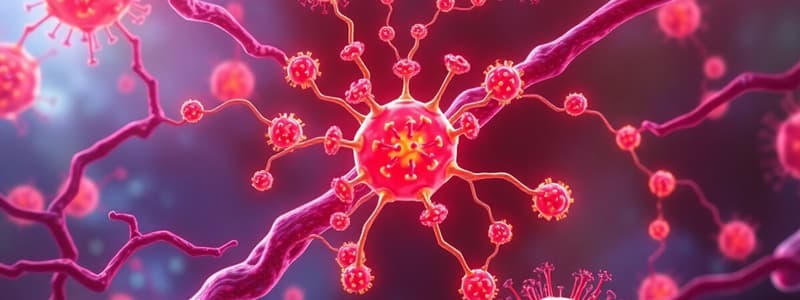Podcast
Questions and Answers
Which of the following complement proteins is synthesized by mast cells?
Which of the following complement proteins is synthesized by mast cells?
- C4
- C3
- C1q (correct)
- C6
What is the approximate serum concentration of C3 in humans?
What is the approximate serum concentration of C3 in humans?
- 480 µg/mL
- 20 µg/mL
- 1300 µg/mL (correct)
- 600 µg/mL
Which component of the complement system has a molecular weight of 24 kDa?
Which component of the complement system has a molecular weight of 24 kDa?
- FD (correct)
- C1q
- C3
- C2
What critical feature does C3 possess that allows it to bind to microbes?
What critical feature does C3 possess that allows it to bind to microbes?
Which complement pathway is described as an 'evolutionarily ancient innate pathway'?
Which complement pathway is described as an 'evolutionarily ancient innate pathway'?
How does C3 get activated in healthy normal animals?
How does C3 get activated in healthy normal animals?
Which of the following statements is true regarding complement proteins?
Which of the following statements is true regarding complement proteins?
What is the function of the thioester group in C3 during the activation process?
What is the function of the thioester group in C3 during the activation process?
What is the effect of factor P (FP or properdin) on the C3 convertase complex?
What is the effect of factor P (FP or properdin) on the C3 convertase complex?
Which pathway accounts for 80% to 90% of complement activation?
Which pathway accounts for 80% to 90% of complement activation?
Which protease is activated by mannose-binding lectin (MBL) after it binds to microbial carbohydrates?
Which protease is activated by mannose-binding lectin (MBL) after it binds to microbial carbohydrates?
What does the lectin pathway primarily react to?
What does the lectin pathway primarily react to?
What component is formed when MBL activates MASP-2, cleaving C4?
What component is formed when MBL activates MASP-2, cleaving C4?
Which component binds to C4b to form the C4b2 complex?
Which component binds to C4b to form the C4b2 complex?
What is the characteristic feature of the family of proteins known as defense collagens?
What is the characteristic feature of the family of proteins known as defense collagens?
What is the half-life of the unstable C3 convertase complex C3bBb?
What is the half-life of the unstable C3 convertase complex C3bBb?
What is required to activate C1 in the classical complement pathway?
What is required to activate C1 in the classical complement pathway?
What is the role of C1s after it is activated?
What is the role of C1s after it is activated?
What complex is formed when C4b binds to C2?
What complex is formed when C4b binds to C2?
What potential outcome can result from blocked inhibitory processes of complement activation?
What potential outcome can result from blocked inhibitory processes of complement activation?
What is formed after C5 is cleaved by the C3bBb convertase?
What is formed after C5 is cleaved by the C3bBb convertase?
What role does the C5b67 complex play in the complement pathway?
What role does the C5b67 complex play in the complement pathway?
Which of the following peptides bind to C5 after C3b is involved?
Which of the following peptides bind to C5 after C3b is involved?
What type of cells can C1q bind to directly, aside from immune complexes?
What type of cells can C1q bind to directly, aside from immune complexes?
What is the primary role of the complement system in the immune response?
What is the primary role of the complement system in the immune response?
How does the complement system get activated?
How does the complement system get activated?
Which pathways are involved in the activation of the complement system?
Which pathways are involved in the activation of the complement system?
What role does the complement system play in inflammation regulation?
What role does the complement system play in inflammation regulation?
Which complement pathways are classified as innate immunity responses?
Which complement pathways are classified as innate immunity responses?
What could happen if the complement system is not properly regulated?
What could happen if the complement system is not properly regulated?
Which statement correctly describes the relationship between the classical pathway of the complement system and antibodies?
Which statement correctly describes the relationship between the classical pathway of the complement system and antibodies?
What additional function does the complement system provide beyond pathogen elimination?
What additional function does the complement system provide beyond pathogen elimination?
What is the role of the terminal complement complex (TCC) in microbial cell membranes?
What is the role of the terminal complement complex (TCC) in microbial cell membranes?
What triggers the inflammatory response associated with complement activation?
What triggers the inflammatory response associated with complement activation?
Which of the following statements about C5a is correct?
Which of the following statements about C5a is correct?
Which complement peptide is known to disrupt bacterial membranes and kill bacteria?
Which complement peptide is known to disrupt bacterial membranes and kill bacteria?
What is the significance of the structure observed in TCC through electron microscopy?
What is the significance of the structure observed in TCC through electron microscopy?
How does substrate modulation affect the complement system?
How does substrate modulation affect the complement system?
What are anaphylatoxins and which peptides are classified as such?
What are anaphylatoxins and which peptides are classified as such?
What is the function of the C5b678 complex?
What is the function of the C5b678 complex?
Flashcards are hidden until you start studying
Study Notes
Complement System
- The complement system is a series of proteins that work together to kill pathogens.
- It is a key component of the innate immune system and can kill pathogens quickly.
- Complement is a network of proteins, proteases, serum proteins, receptors, and regulators that all work together.
- It is activated by the presence of either pathogen-associated molecular patterns (PAMPs) or by antigen-bound antibodies.
- The system is tightly regulated and disturbances can result in inflammation or autoimmunity.
Functions of the Complement System
- The complement system has many functions including:
- killing pathogens
- alerting the immune system to invaders
- regulating inflammation
- removing damaged or altered cells
- regulating adaptive immune responses
- clearing antigen-antibody complexes
- blood vessel formation
- mobilization of stem cells
- tissue regeneration
- lipid metabolism
Complement Activation Pathways
- There are three main pathways for complement activation:
- Alternative Pathway
- activated by microbial cell walls
- triggered by C3, the most abundant complement component in serum
- C3 spontaneously breaks down into C3a and C3b
- C3b binds to microbes and marks them for destruction
- Lectin Pathway
- activated by the binding of soluble pattern-recognition molecules (lectins) to microbial carbohydrates
- triggered by the presence of bacterial PAMPs
- lectins bind to microbes and activate proteases that activate complement
- mannose-binding lectin (MBL) and ficolins are the main lectins
- Classical Pathway
- activated by antibodies
- is an adaptive pathway
- triggered by antigen-bound IgM or paired, antigen-bound IgG molecules
- C1 binds to antibody and is then activated, cleaving C4 into C4a and C4b
- C2 binds to C4b, creating a complex that acts as a protease to cleave C3
- Alternative Pathway
Amplification Pathway
- All surface-bound C3 convertases (from the alternative, lectin, or classical pathway) can trigger the amplification pathway.
- C5 binds to C3b and is then cleaved by C3bBb.
- This generates C5b that can bind to C6 and C7, forming a complex that inserts into the microbial cell wall.
- C8 then binds, followed by polymerization of 12-18 C9 molecules to form the terminal complement complex (TCC).
- The TCC forms a pore in the microbial cell membrane, causing osmotic lysis.
Complement Proteins
- Complement proteins are either labeled numerically (e.g., C1, C2, C3) or designated as "factors" by letters of the alphabet (FB, FD, FP, etc.).
- They account for 5% to 10% of the proteins in blood serum.
- Their size varies from 24 kDa for factor D (FD) to 460 kDa for C1q.
- Complement proteins are synthesized at multiple sites, including the liver, macrophages, and mast cells.
Substrate Modulation
- Substrate modulation is one way that the complement system is regulated.
- A target for a protease cannot be cleaved unless it is first bound to another protein.
- Examples include the cleavage of factors C2, B, and C5 only after they have bound to C4, C3, and C3, respectively.
Biological Consequences of Complement Activation
- C5a, a small released peptide, has potent inflammatory effects.
- It can degranulate mast cells and stimulate platelets to release histamine and serotonin.
- It attracts neutrophils and macrophages.
- It increases vascular permeability.
- C3a can kill bacteria by disrupting cell membranes.
Studying That Suits You
Use AI to generate personalized quizzes and flashcards to suit your learning preferences.


![Lecture 04: The Complement System and Pathways in Immunology {MCQ 1]](https://assets.quizgecko.com/cdn-cgi/image/width=300,height=200,fit=crop,quality=75,format=webp/quiz/0c9d7db8e7a538eb3326d8a833db6ee5.jpg)
